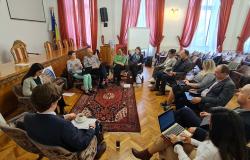UNIGEM PROJECT MONITORING: Report on teaching staff training at partner universities in the course of 2022 and the 1st quarter of 2023

This overview of planned and implemented teaching staff trainings at partner universities was written on the basis of reports on the monitoring of activities from the Action Plans for Gender Equality of the partner universities within the UNIGEM project, and quarterly coordinator reports.
The baseline research that was carried out at the beginning of the UNIGEM project in 2021 has shown that there is room for significant improvement of fundamental and advanced knowledge on the topic of gender equality, gender discrimination and gender-based violence in academic communities among teaching staff and students. The research showed that the teaching staff has a poor understanding of basic terms in the field of gender equality and gender-based violence. In this regard, the goal of these trainings is to raise awareness and strengthen the capacity of teaching staff in the areas of gender equality and gender policies in higher education, primarily through research and teaching.
A more detailed analysis of the universities' Action Plans for gender equality revealed that the capacity building focused on teaching staff is defined differently in terms of goals and strategic areas. At certain universities, the capacity building and training are explicitly highlighted in the goals or strategic areas, while in other cases the capacity building is transversal in such a way that it permeates through all the goals listed in the Action Plans. More common is the variant of explicitly defined goals that relate to either trainings or raising employees' awareness of the importance of the topic of gender equality in the university environment.
Regarding the necessary support needed to overcome various obstacles posed to implementation of staff trainings that were outlined by coordinators and councils/committees for gender equality, the most important type of support that these universities need is organizational support, which is in line with the findings in the reports that illustrate continuity in the implementation of training activities exists only when these activities are supported by projects, in the specific case of the UNIGEM project.
Universities face organizational difficulties that are also related to their limitations in attracting gender equality experts as well as the availability of financial resourcesnecessary for the continuous trainings. Certainly, a significant factor in the organization and implementation of trainings is the provision of management support. Where support from the rectors and their associates is present, the administrative procedures are significantly accelerated and it is easier to ensure the continuity and sustainability of such workshops and trainings even after external projects like UNIGEM come to an end.
Reports on the monitoring of activities from the Action Plans were also aimed at identifying the obstacles that universities encountered in the implementation of trainings for teaching staff. According to these reports, the most common type of obstacles at partner universities are organizational and individual obstacles in the form of collective and individual resistance. Namely, within the framework of the university as a whole, it is difficult to develop a unified organizational culture. Each faculty within the university has a certain degree of autonomy and its own organizational values and culture, which are significantly influenced by the value system promoted by the administration of that particular faculty. If the faculty administration is indifferent and uninterested in mobilizing and motivating its teaching staff for trainings on gender equality or even demonstrates explicit resistance to such trainings, greater the chance that obstacles of an organizational nature will arise at these universities, either in the form of collective and/or individual resistance or even the absence of organizational support and readiness for gender equality activism within the university.
The findings from the aforementioned reports clearly indicate that, although there is heterogeneity in terms of the structure and size of partner universities, there are similar challenges in the processes of introducing gender policies at universities, especially in strengthening the capacity of teaching staff in this domain. Taking into account the identified problems, necessary support and barriers to capacity building, the overall conclusion draws on the importance of the university's cooperation with external partners such as non-governmental organizations (e.g. TPO Foundation), governmental organizations dealing with gender equality and international partners who can provide organizational, expert and financial support which universities often lack.
On the other hand, the issue of overcoming obstacles at the individual level in the form of individual and collective resistance is a problem that university administrations will have to deal with more intensively and systematically, if these universities are willing to become role models in promoting gender equality, social inclusion and societal values based on human rights.








